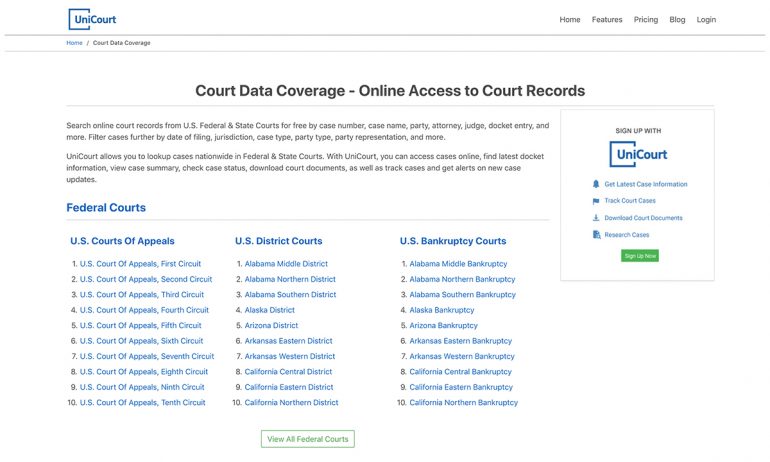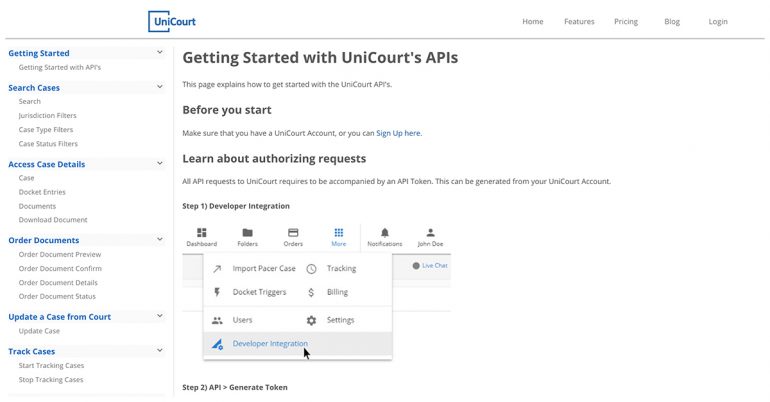A2J Q&A: UniCourt CEO Josh Blandi on making court data more accessible and pushing forward to make government records public records.

Table of contents
When I ran Evolve Law, I met some amazing CEOs, many who shared a passion for access to justice. Josh Blandi, CEO and Co-Founder of UniCourt, was one of those leaders. UniCourt is a Software as a Service (SaaS) offering using machine learning to disrupt the way court records are organized, accessed and used. UniCourt connects businesses and consumers to the records they need and enables them to tap into the mountain of court data generated every day for legal analytics, business intelligence and development, background checks, research, and many other innovative uses.
Here’s our Q&A.
Quick Answers with Easy Access
- When I was a kid I wanted to be: An NBA basketball player.
- My greatest accomplishment: CountryWide Debt Relief and UniCourt.
- Never forget to: Say “please” and “thank you!”
- I work best in: The office with my team.
- My best ideas come from: The shower.
- The toughest lesson I’ve learned is: Startups take time to scale.
- My pick-me-up is: Coffee.
- My attitude towards life is: Take it as it comes.
- Best advice I’ve ever received is: Look to find common interests.
Productivity Habits for Federal Courts
Describe your morning routine.
Handle any roadblocks for the different teams, respond to customers (sales), check email and prepare for the day’s meetings.
What is the first thing you “check” each morning?
Sign-ups! Then messages from my CTO/Co-Founder.
Where do you like to work?
In my office. Having an environment with as few distractions as possible is very important to staying focused and solving complex problems. All of this remote and on-the-go stuff via phone is great for basic tasks but it is no place to do sales or solve problems.
What’s your email strategy?
Handle the most important and time-sensitive emails first, then snooze the rest. It is important to make time each day to solve problems, plan and actually run a company rather than spend your day answering emails. I set a limit of three hours each day to address emails. If I don’t get to them all, that’s just the way it goes.
What’s your best productivity habit?
Calendaring important tasks and meetings like meeting with department heads to address issues and push things forward on an ongoing basis. For me, if I don’t block time out on my calendar to handle ongoing needs, they’ll never get done and my team will be left in the waiting room! That’s not fair to them.
What’s your favorite productivity tool?
Google Suite, MacBook Pro, iPhone.
What’s the one habit you wish you could kick?
Stop being so anal! I’m a details guy but as you go from being a startup, wearing a bunch of hats, to scaling, you must learn to let the little stuff go. I’ve adapted the standard that I don’t have to love it, but I can live with it. You also need to empower your team to take ownership and responsibility for their work and results. If you’re always putting your hand into everything, it really leaves no room for growth and innovation for your team. Being detail oriented is a double-edged sword; you really have to know when to use it and when not to.
What do you let slide?
Any mistake that can be used as a learning opportunity for the team. We all make mistakes and can improve, but we should learn from them so we don’t keep repeating them. If a person keeps making the same mistakes, then either they don’t have the right manager or they are not the right fit for the job.
What’s your nightly routine?
Hang out with my daughter, then after she goes to bed, work, work, work!
The Problem with Accessing Court Documents
Getting through the court documents can be a nightmare especially if you’re not familiar with the legal system. The traditional process of getting court records is time consuming and expensive, including physical visits to courthouses. The complexity of the court process and the system is opaque and makes it hard to find the information you need.
And traditional ways of getting court documents whether physical or online are limited in scope and comes with subscription fees or other costs. This creates a big barrier for individuals who want to get court records for research, legal purposes or personal reasons.A Deeper Dive into UniCourt Federal Court Records
How do you define access to justice (A2J)?Access to justice is a broad concept that, to me, means everything from access to affordable legal services and court records to being able to obtain quicker and just case resolutions. More concretely, access to justice means putting everyone on the same playing field and providing access to affordable legal services through the use of technology.
Tell us about your connection to A2J.One of the important issues I care about is protecting the public’s right to know and access to court records and other public records. To me, a foundational aspect of ensuring justice is advocating for open and unfettered access to the laws that govern and impact people’s lives. Without affordable and meaningful access to laws and court records, people are already at a disadvantage when it comes to interacting with the legal system.
How are you solving access to justice for your clients?Beyond providing affordable plans where consumers can easily search for cases, do background checks, download documents (often for free from our CrowdSourced Library) and track cases to receive alerts on new filings, we are also focused on making all court data just a Google search away.

UniCourt provides access to federal and state court data, including federal court records, which are crucial for comprehensive legal research.
With a simple Google search, you can find information about cases, parties and attorneys you otherwise might not be able to find. An example of the type of information we make freely available to the public is found here.
Also, UniCourt seeks to improve access to justice by making interaction with the legal system easier. With our search function, consumers and small businesses can look for cases by party, attorney, judge, case type and jurisdiction to easily narrow down their search results and find the cases that matter. Users can search for detailed docket entries to track case statuses and filings. Once our clients find important cases or ones they are interested in, they can begin tracking those cases with the click of a button and receive automatic notifications for any new updates or filings that occur.
Once our clients find important cases or ones they are interested in, they can begin tracking those cases with the click of a button and receive automatic notifications for any new updates or filings that occur. Additionally, users can file documents electronically and report issues through the platform.
We have placed a considerable amount of effort in developing meaningful legal analytics to help our clients make the most informed decisions possible. Using machine learning and entity normalization, we provide clients with analytics on attorneys and law firms, so that they can choose the lawyers with the most experience. For example, with UniCourt you can quickly find out the top plaintiff’s attorney for wrongful termination cases, the top civil rights attorneys or defense attorneys for debt collection. Our analytics also include insights on judges, helping clients understand the judicial landscape.
We also have developed a series of legal data APIs to provide clients and other innovators with bulk access to court data and on-demand updates for cases. For the most part, court data has not really been exposed to the general public and we see the broader exploration of this data as greatly accelerating legal innovation across the board. Users can request specific court documents or case information through the APIs. We welcome any innovators or non-profits interested in accessing court data through our APIs to contact us to learn more.

What role does technology play in access to justice?Technology is a powerful equalizer. In the context of access to justice, technology empowers consumers to better understand and interact with the legal system, and it is a driving force behind the continued push for making legal services more affordable. Technology can also empower attorneys interested in bridging the access to justice gap by helping them better find and connect with the clients in need of their services.
One quick use case from UniCourt comes to mind. Over the past couple of years, we have put in considerable effort to create a seamless searching system with optimal search options, so that attorneys, businesses and consumers can make the most of their time. Let’s say you’re an attorney with expertise in family law or property law. With our tagging system, you can easily search for parties who are self-represented, and can further refine results by case type and jurisdiction — often by an individual courthouse, to find potential clients in need of your help. Even further, attorneys can use our automated search function to set up recurring searches on a daily, weekly or monthly basis to keep finding new clients in need. Users can also track new filed cases and receive notifications for any updates.
Do you see client knowledge of legal issues, or the education gap, as an issue?Absolutely, but that will change with artificial intelligence and technology. I see a world very soon where anyone who has a legal question can connect with an experienced attorney or a chatbot to discuss their issue and determine if it’s worth pursuing or not, and if so, determine on the spot what the cost will be. So in that respect, the individual will not be more knowledgeable per se, but technology will increase their access to knowledge in a quick and easy manner.
What have you had to change based on feedback?Everything; if you are not collecting user feedback and analyzing it, you won’t be able to make a good product.
What have you learned the hard way?People don’t like change, so you have to position the change in a way where they receive lots of benefit versus marginal benefit. Also, raising money is a huge time suck and investors are not going to invest in you unless you have $2M in annual revenue, or unless you graduated from Stanford, LOL.
How are you growing your company?Building more online presence, thought leadership, and our legal analytics and Legal Data APIs.
What is your best tip for supporting access to justice?There is a lot to be done. Pick one issue where you can contribute and advocate and grow it. My issue is the right to know. I’m passionate about advocating for the public’s right to know and easily access court records and other public records. I’m proud that UniCourt continues to push forward to make government records public records.
Where is the A2J movement going?As the A2J movement continues to gain steam, delivering affordable legal services to the 80% of Americans without access will likely be the continued direction. Focusing on this segment makes the most sense and can also have the most impact.
Where are YOU going?UniCourt is moving toward making all court records and other public records interconnected so that anyone can look at a court record, click on an involved party or entity, and see their connected web of cases, entities and other public records, such as Secretary of State filings, UCC filings, lobbyist records and more. A good example: You could start by looking at a Secretary of State filing for a business, see all of the litigation that business has been involved in, open an individual case where that business got sued, then look at the attorneys involved to see all of their cases, find out which law firms they have worked for and then also look at all of the Secretary of State filings by their law firms.
How it Works
UniCourt makes court records accessible by providing a simple, user-friendly platform that aggregates and organizes data from federal and state courts. UniCourt uses technology to make it easy to search and get the records you need.
With UniCourt’s search engine you can search by case number, party name or other search criteria. The platform returns full search results with access to all court documents including pleadings, motions and orders which can be viewed online or downloaded.
Why UniCourt
UniCourt has many benefits that makes accessing court records easier and faster:
- Easy Court Records: No need to visit the courthouse or pay for subscription-based databases, just simple access to court records.
- Full Search Results: The platform returns full search results with case information, court documents and legal analytics.
- Affordable: UniCourt’s services is designed to be cost effective, no more financial barriers to access court records.
- Faster: UniCourt saves you time by simplifying the search process so you can get what you need fast.
By solving the problem of court documents and making it more efficient and affordable UniCourt is changing the way we deal with the law.
Knowledge Is Power!
It’s certainly an exciting time for attorneys because of companies and people like Josh. Technology levels the playing field in all industries and professions. I firmly believe that closing the education gap will go a long way to improving access to legal services. #onwards.
Find out more information about UniCourt here.
Read additional A2J interviews by Mary Juetten here.















